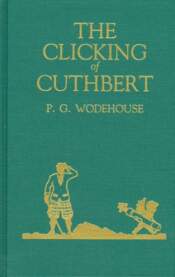-
 By P. G. Wodehouse Many have tried to explain why Wodehouse's golf stories are so utterly enjoyable and so far above anyone else's efforts in the genre. They are the product of a genius who wrote over ninety books and who created two of the greatest fictional characters in the English language: the dim-witted but loveable Bertie Wooster, and his valet, the amazingly ingenious Jeeves. The Clicking of Cuthbert is Wodehouse's first collection of golf stories, published in England in 1922. We have reproduced the cover of the original English edition but have used the text of the American edition, which was called Golf without Tears. One of the things that may strike you as odd is how much and how immediately you will like these stories. You will even find yourself laughing aloud. "Odd" because normally when such pleasure is presented to us we become suspicious. What is the hidden message? What does he really want of us? What's he getting at? Where's the deeper meaning? There is no deeper meaning in Wodehouse. His deeper meaning is the pleasure and satisfaction that is felt by his readers - genuine pleasure and genuine satisfaction that comes and can only come from the recognition of the truth of a given situation and a given character. In order to produce so many laughs and so many smiles Wodehouse had to be a master of his craft. There was none finer, and no one worked harder to achieve that mastery. His prose style was deceptively simple and clear. As John Updike observed in a recent magazine article, he knew his golf.: "Wodehouse's grasp of the strange joy and fascination of the game is absolute." Sir Peter Allen, gifted golfer, writer, traveler, and industrialist has evoked in his Afterword what the world of golf was like in the early 1920s, the world P.G. Wodehouse studied for these stories. Herbert Warren Wind's Foreword is a sparkling biography of Wodehouse and a splendid way to start the book. Wind did a profile of Wodehouse for The New Yorker magazine and spent a good deal of time with him while researching his essay. It was later published in book form in England under the title, The World of P.G. Wodehouse. Foreword by Herbert Warren Wind, Afterword by Sir Peter Allen.
By P. G. Wodehouse Many have tried to explain why Wodehouse's golf stories are so utterly enjoyable and so far above anyone else's efforts in the genre. They are the product of a genius who wrote over ninety books and who created two of the greatest fictional characters in the English language: the dim-witted but loveable Bertie Wooster, and his valet, the amazingly ingenious Jeeves. The Clicking of Cuthbert is Wodehouse's first collection of golf stories, published in England in 1922. We have reproduced the cover of the original English edition but have used the text of the American edition, which was called Golf without Tears. One of the things that may strike you as odd is how much and how immediately you will like these stories. You will even find yourself laughing aloud. "Odd" because normally when such pleasure is presented to us we become suspicious. What is the hidden message? What does he really want of us? What's he getting at? Where's the deeper meaning? There is no deeper meaning in Wodehouse. His deeper meaning is the pleasure and satisfaction that is felt by his readers - genuine pleasure and genuine satisfaction that comes and can only come from the recognition of the truth of a given situation and a given character. In order to produce so many laughs and so many smiles Wodehouse had to be a master of his craft. There was none finer, and no one worked harder to achieve that mastery. His prose style was deceptively simple and clear. As John Updike observed in a recent magazine article, he knew his golf.: "Wodehouse's grasp of the strange joy and fascination of the game is absolute." Sir Peter Allen, gifted golfer, writer, traveler, and industrialist has evoked in his Afterword what the world of golf was like in the early 1920s, the world P.G. Wodehouse studied for these stories. Herbert Warren Wind's Foreword is a sparkling biography of Wodehouse and a splendid way to start the book. Wind did a profile of Wodehouse for The New Yorker magazine and spent a good deal of time with him while researching his essay. It was later published in book form in England under the title, The World of P.G. Wodehouse. Foreword by Herbert Warren Wind, Afterword by Sir Peter Allen.
